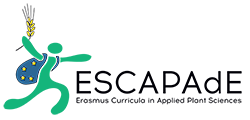English title:
Crop rotation systems and production methods in organic farming
Course ID:
933105
ECTS credits:
1,5
Title in native language:
Fruchtfolgesysteme und Anbauverfahren in der ÖLW
Fruchtfolgesysteme und Anbauverfahren in der ÖLW
Term Semester:
Spring/Summer
Instruction language(s):
German
Course content:
Selection of crops and description of crop performances; developing model crop rotations; conversion of conventional, integrated crop rotations to organic crop rotations; to understand the most important crop rotations;
- Introduction in self-(in)compatibility, precrop effects and functions of crop rotations in different cropping systems (conv.-integrated-organic), share of crop, yields, interactions of management measures
- Development of crop rotations of different farm types and climate zones
- Crop management of most important crops in organic farming
- Excercises (research farm) and final discussion
- Introduction in self-(in)compatibility, precrop effects and functions of crop rotations in different cropping systems (conv.-integrated-organic), share of crop, yields, interactions of management measures
- Development of crop rotations of different farm types and climate zones
- Crop management of most important crops in organic farming
- Excercises (research farm) and final discussion
Expected previous knowledge:
LVA Organic Agriculture ("Ökologische Landwirtschaft")
Learning outcomes:
Graduates of this course
- know the main crops in organic farming;
- understand essential criteria for planning crop rotations like self-(in)compatibility and pre-crop effects;
- assess the sustainability of crop rotations;
- develop independently crop rotations of organic and conventional farming.
- know the main crops in organic farming;
- understand essential criteria for planning crop rotations like self-(in)compatibility and pre-crop effects;
- assess the sustainability of crop rotations;
- develop independently crop rotations of organic and conventional farming.
Teaching and learning methods:
Lecture with integrated exercises.
Convey knowledge on crop species and their requirements, self-(in)compatibility, relations of pre-crops and following crops, interrelations of management measures.
Demonstration of crop growing and crop management for selected crops on experimental fields. Instructions to field assessment. Feedback to the self-dependently generated crop rotation examples
Convey knowledge on crop species and their requirements, self-(in)compatibility, relations of pre-crops and following crops, interrelations of management measures.
Demonstration of crop growing and crop management for selected crops on experimental fields. Instructions to field assessment. Feedback to the self-dependently generated crop rotation examples
Exam method:
Prerequisite for the assessment is participation in one field exercise.
Assessment is according to the generation and presentation of a crop rotation in organic farming for defined site conditions in a small group.
Assessment is according to the generation and presentation of a crop rotation in organic farming for defined site conditions in a small group.
Organisation: University of Natural Resources and Life Sciences Vienna
Country:
Austria
Acronym:
BOKU
ERASMUS+ code:
A WIEN03
Teaching period summer semester:
22. Feb 2021 - 30. Sep 2021
Teaching period winter semester:
13. Oct 2020 - 21. Feb 2021
University website:
